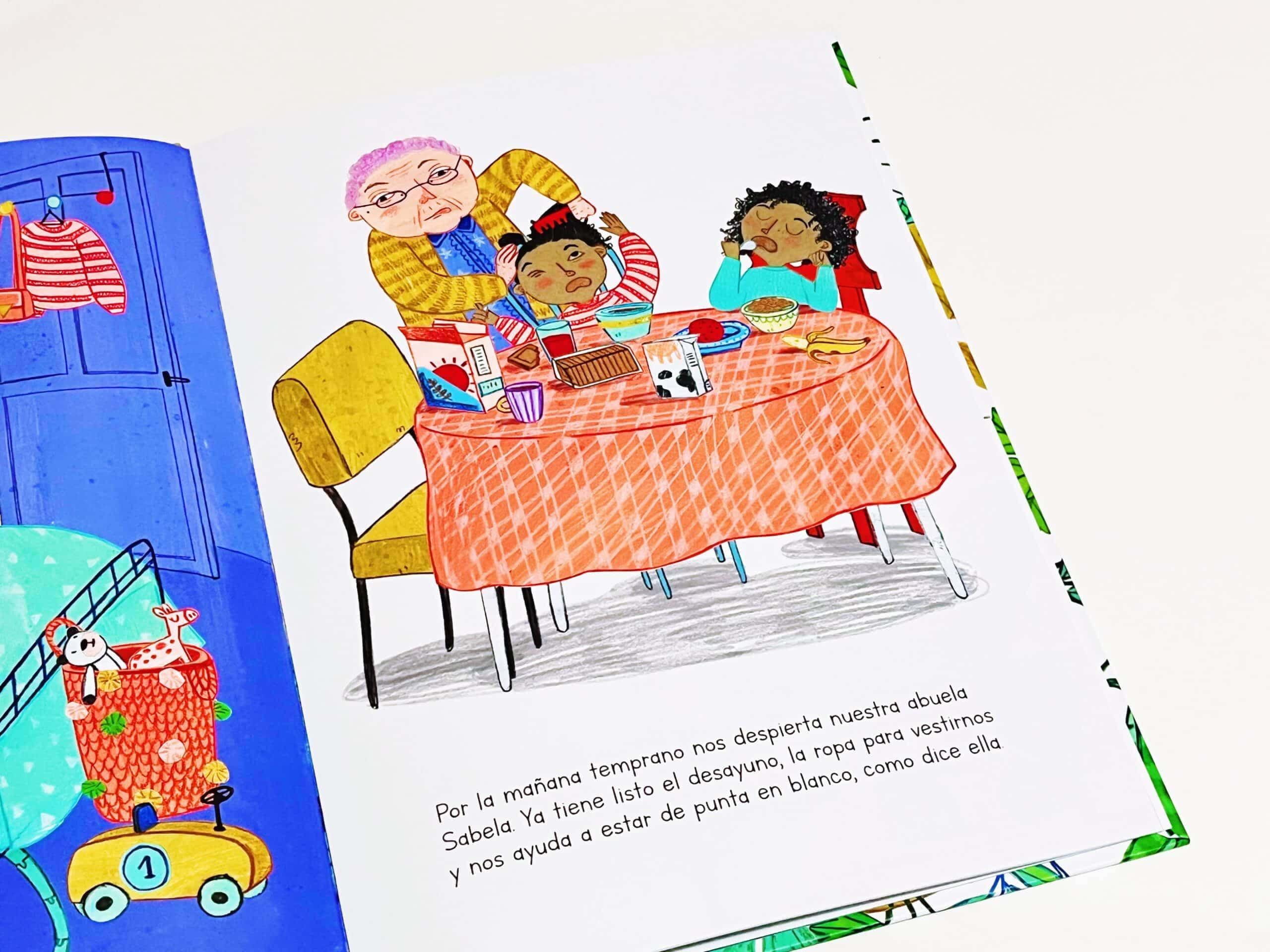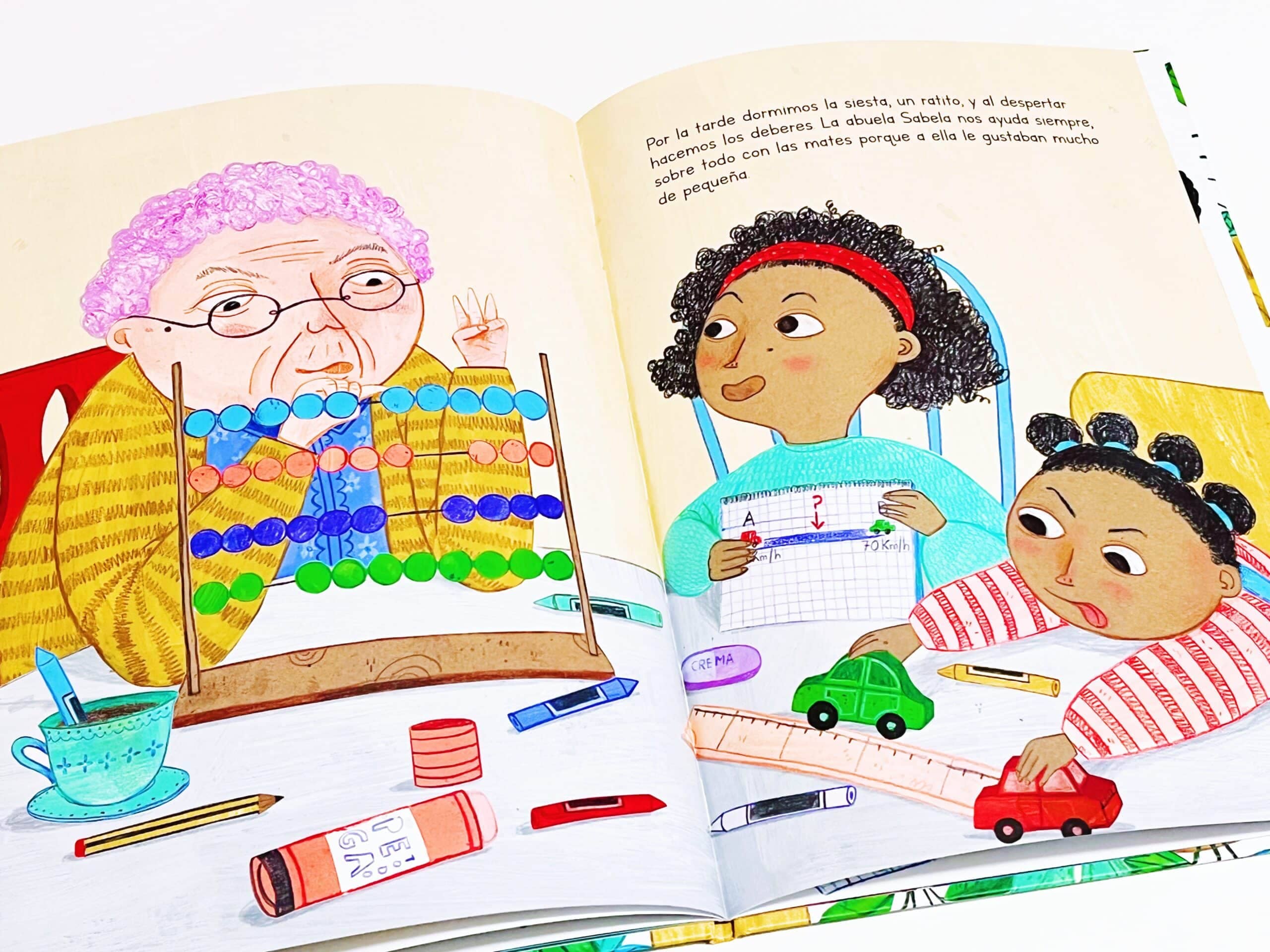There's something magical about the phrase "buenos dias abuela." It’s not just a simple greeting; it's a bridge that connects generations, cultures, and hearts. Imagine walking into your grandma's kitchen, the smell of freshly baked cookies wafting through the air, and hearing her say those words with so much love. It’s more than language; it’s a feeling. This phrase carries with it years of tradition, warmth, and respect that can only come from family bonds. So, let’s dive deep into why this phrase holds such significance and how it shapes our understanding of relationships across cultures.
Now, before we get into the nitty-gritty details, let me tell you something. The phrase "buenos dias abuela" is more than just a way to say good morning to your grandmother. It’s a cultural phenomenon that speaks volumes about the values of respect, family, and tradition. In today’s fast-paced world, where everything seems to move at lightning speed, taking a moment to greet someone with such sincerity feels like a breath of fresh air. It reminds us to slow down and cherish the little things in life.
As we explore this topic, you’ll discover the depth behind these simple words, how they’re used in different contexts, and why they matter so much. Whether you’re learning Spanish for the first time or simply curious about the beauty of cross-cultural communication, this article will give you plenty to think about. Let’s make this journey meaningful and insightful, shall we?
- Yao Shaq The Rise Of A Phenomenal Basketball Legend
- Red And Pink Mixed A Bold Yet Romantic Color Palette
What Does Buenos Dias Abuela Mean?
At its core, "buenos dias abuela" translates to "good morning, grandmother" in English. But let’s be real—it’s so much more than that. When you say these words, you’re not just wishing someone a good day; you’re showing them respect, love, and gratitude. In many Spanish-speaking cultures, addressing elders with honorifics like "abuela" is a sign of reverence and admiration. It’s a beautiful tradition that reinforces the importance of family ties.
Think about it. Every time you say "buenos dias abuela," you’re acknowledging the role your grandmother plays in your life. She’s the one who’s been there through thick and thin, offering wisdom, comfort, and unconditional love. This phrase is a small yet powerful way of saying, "Thank you for everything you’ve done for me."
Why Is It Important to Use Honorifics in Spanish?
In Spanish-speaking countries, using honorifics isn’t just polite—it’s essential. Words like "abuela," "abuelo," "tia," and "tio" are used to show respect and maintain strong family bonds. It’s a cultural norm that reflects the value placed on relationships and traditions. By addressing your elders with these titles, you’re showing that you respect their position in the family hierarchy and appreciate everything they’ve contributed to your life.
- How To Prepare Chamoy For Selling A Stepbystep Guide
- Fogo 39 Special Price Unlock Exclusive Deals Today
For example, if you were to simply say "buenos dias" without adding "abuela," it might come across as impersonal or even disrespectful. Adding that extra touch makes all the difference. It’s like saying, "Hey, I see you, and I value you." Who wouldn’t want to hear that?
How to Use Buenos Dias Abuela in Everyday Conversations
Now that you know what "buenos dias abuela" means, let’s talk about how to use it in real-life situations. Whether you’re visiting family in Latin America or learning Spanish with friends, this phrase is a great way to show respect and start conversations. Here are some tips to help you use it effectively:
- Greet your grandma first thing in the morning: Start your day with a warm "buenos dias abuela" to brighten her day.
- Use it during family gatherings: At dinner or during special occasions, take a moment to greet your grandmother with this phrase. It’ll mean a lot to her.
- Pair it with a hug or kiss: Actions speak louder than words, right? Combine your greeting with a physical gesture to show how much you care.
- Practice with friends: Even if you’re not speaking to your actual grandma, you can use this phrase with friends who appreciate cultural traditions.
Remember, the key is to be genuine. If you say "buenos dias abuela" with sincerity, it’ll resonate deeply with the person you’re speaking to. It’s not just about the words; it’s about the emotion behind them.
Common Misconceptions About the Phrase
There are a few misconceptions floating around about "buenos dias abuela" that we need to clear up. For starters, some people think it’s only used in formal settings, but that’s not true. In fact, it’s quite the opposite! This phrase is most commonly used in casual, everyday conversations within families. It’s a warm and personal way of connecting with loved ones.
Another misconception is that it’s outdated or only used by older generations. Wrong again! Young people today are embracing this phrase as a way to honor their heritage and stay connected to their roots. It’s a timeless tradition that continues to thrive, no matter the generation.
The Cultural Significance of Buenos Dias Abuela
Culture plays a huge role in shaping the way we communicate with each other. In Spanish-speaking cultures, greetings like "buenos dias abuela" are deeply ingrained in daily life. They’re a reflection of the values that these societies hold dear, such as respect, family, and tradition. Let’s take a closer look at why this phrase is so culturally significant.
First and foremost, it emphasizes the importance of family. In many Latin American countries, family is the cornerstone of society. Elders are respected and revered, and phrases like "buenos dias abuela" are a way of acknowledging their wisdom and experience. It’s a reminder that we’re all part of something bigger than ourselves.
How Does It Differ Across Regions?
While the basic meaning of "buenos dias abuela" remains the same, there are slight variations in how it’s used across different regions. For example, in Mexico, you might hear people add extra flair to their greetings by saying "¡Buenos dias, mi querida abuela!" which translates to "Good morning, my dear grandmother." In Spain, on the other hand, the phrase might be a bit more formal and straightforward.
These regional differences highlight the diversity within Spanish-speaking cultures. They show how each country puts its own unique spin on traditions while still maintaining the core values that unite them.
Learning Buenos Dias Abuela: Tips for Beginners
If you’re new to Spanish or just want to improve your skills, "buenos dias abuela" is a great phrase to start with. It’s simple, easy to pronounce, and incredibly useful in everyday conversations. Here are a few tips to help you master it:
- Practice pronunciation: Listen to native speakers say the phrase and try to mimic their intonation. It’ll make you sound more natural and confident.
- Use it regularly: The more you use the phrase, the more comfortable you’ll become with it. Try saying it to friends, family, or even yourself in the mirror!
- Learn related phrases: Expand your vocabulary by learning other greetings and honorifics, such as "buenas tardes" (good afternoon) and "abuelo" (grandfather).
Remember, language learning is a journey, not a destination. Don’t be afraid to make mistakes along the way. The important thing is that you’re trying, and that’s what matters most.
Common Mistakes to Avoid
When learning a new language, it’s easy to make mistakes. Here are a few common ones to watch out for when using "buenos dias abuela":
- Forgetting to use the honorific "abuela" after "buenos dias." Always remember to include it to show respect.
- Mispronouncing the words. Take your time and practice until you get it right.
- Using the phrase inappropriately. While it’s a warm and friendly greeting, it’s best reserved for family members or close friends.
By avoiding these pitfalls, you’ll be well on your way to using the phrase like a pro!
The Emotional Impact of Saying Buenos Dias Abuela
There’s something truly special about the emotional impact of saying "buenos dias abuela." It’s not just about the words themselves; it’s about the connection they create. When you greet your grandmother with this phrase, you’re opening the door to a world of love, laughter, and shared memories. It’s a moment of pure joy that can brighten both your day and hers.
For many people, saying "buenos dias abuela" is a daily ritual that brings comfort and stability. It’s a reminder that no matter what challenges you face, you have a support system that loves you unconditionally. In a world that often feels chaotic and uncertain, this simple act of kindness can make all the difference.
Stories of Connection Through Language
Let’s take a moment to hear from some real people who’ve experienced the power of "buenos dias abuela" firsthand. One woman shared how saying this phrase to her grandmother every morning brought them closer together, even during difficult times. Another man talked about how learning this phrase helped him connect with his roots and better understand his family’s cultural heritage.
These stories highlight the universal appeal of language as a tool for connection. No matter where you’re from or what your background is, saying "buenos dias abuela" can create a bond that transcends borders and barriers.
Modern Relevance of Buenos Dias Abuela
In today’s globalized world, phrases like "buenos dias abuela" are more relevant than ever. As people from different cultures interact and learn from each other, these traditions serve as a reminder of the importance of respect and understanding. They show us that even in a fast-paced, technology-driven society, there’s still room for heartfelt connections.
Moreover, as younger generations embrace their cultural heritage, phrases like "buenos dias abuela" are being celebrated and shared on social media platforms. This helps to preserve and promote these traditions, ensuring that they continue to thrive for years to come.
How Technology is Changing the Way We Use It
While technology can sometimes feel like a barrier to personal connections, it’s also a powerful tool for preserving cultural traditions. Apps and platforms that teach languages, for example, are making it easier than ever for people to learn phrases like "buenos dias abuela." Social media is also playing a role by allowing people to share their experiences and connect with others who share similar values.
So, while the way we communicate may be evolving, the underlying message of "buenos dias abuela" remains the same: love, respect, and connection.
Conclusion: Embrace the Magic of Buenos Dias Abuela
In conclusion, "buenos dias abuela" is more than just a phrase—it’s a cultural treasure that connects generations and fosters meaningful relationships. Whether you’re learning Spanish for the first time or simply looking for ways to strengthen your family bonds, this greeting is a wonderful place to start. By embracing its significance and using it in your daily life, you’re contributing to a tradition that’s been passed down through the ages.
So, what are you waiting for? Go ahead and say "buenos dias abuela" to someone special in your life today. Share this article with your friends and family, and let’s keep this beautiful tradition alive. Who knows? You might just find that it changes your perspective on relationships and communication in ways you never expected.
Table of Contents
What Does Buenos Dias Abuela Mean?
Why Is It Important to Use Honorifics in Spanish?
How to Use Buenos Dias Abuela in Everyday Conversations
Common Misconceptions About the Phrase
The Cultural Significance of Buenos Dias Abuela
How Does It Differ Across Regions?
Learning Buenos Dias Abuela: Tips for Beginners
- Incredible Insights On Informal Macro A Deep Dive Into The Hidden Economy
- Alfa Romeo Pink A Splash Of Style And Performance


